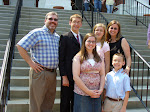
Saturday, October 27, 2007
My Parents Are Here!

Monday, October 22, 2007
My Final Word on "A Common Word"

The "OHIO CURSE" Lives On
Good News: PITTSBURGH LOST ON THE LAST PLAY OF THEIR GAME AGAINST THE DENVER BRONCOS! I was watching both games simultaneously, and I was comforted by seeing Pittsburg walking off the field in stunned silence. That is always, always, a sweet feeling.
Wednesday, October 17, 2007
INDIANS 7 / RED SOX 3
Monday, October 15, 2007
Joel Osteen on 60 Minutes

The New (Old?) Face of Atheism
"He showed up drunk to an exclusive NY dinner club meeting (hosting by
David Horowitz), proceeded to make anti-Semitic remarks, insulted a member of
the club (a priest, who also happened to be a 9/11 hero), and had to be
physically restrained twice as he flew into rages aimed at said priest."
Read about it here, and here.
Sunday, October 14, 2007
Saturday, October 13, 2007
HOLLYWOOD'S TOP 12 CHRISTIANS?

Friday, October 12, 2007
Part III of "A Common Word"

Let me quote some portions of the letter and then make some observations and/or ask questions.
Under the first heading in Part III, the writers say:
Whilst Islam and Christianity are obviously different religions - and whilst there is no minimising some of the formal differences - it is clear that the Two Greatest Commandments are an area of common ground adn a link between the Qur'an the Torah and the New Testament.
What are these "formal differences?" The writers have made no reference to these, and I am curious as to what they think of the differences.
Immediately after this, the writers say the following:
What prefaces the Two Commandments in the Torah and the New Testament, and what they arise out of, is the Unity of God - that there is only one God....Thus the Unity of God, love of Him, and love of the neighbour form a common ground upon which Islam and Christianity (and Judaism) are founded (:13).
I am becoming concerned about this phrase "Unity of God," which occurs throughout the letter. What exactly is meant by this? I know Muslims have a very hard time with the concept of the Trinity. Is all this letter a failure to recognize this? Is all this really a call to reject Trinitarianism, a fundamental teaching of Christianity?
On page 14, the writers launch into a most strange invitation. They write:
"Muslims, Christians and Jews should be free to each follow what God commanded them, and not have 'to prostrate before kings and the like'; for God says elsewhere in the Holy Qur'an: Let there be no compulsion in religion....(Al-Baqarah, 2:256)."
This puzzles me. Muslims are inviting Christians not to use compulsion in religion? What is so strange about this is that this is almost the definition of religious practice in America! Does the same practice prevail in Iran? in Pakistan? in Saudi Arabia? Muslim nations all!
The writers also say this:
As Muslims, we say to Christians that we are not against them and that Islam is not against them -- so long as they do not wage war against Muslims on account of their religion, oppress them and drive them out of their homes...
I don't understand the issue here. Where in the world are Christians waging war against Muslims? Although there are many Christians in the United States, American is not an official Christian nation. They cannot be referring to the war in Iraq, can they? Even if American were Christian, the war is not being waged against Muslims on account of their religion, but on account of certain terrorist commitments. Clearly this acceptance quoted above is conditional, subject to much interpretation. I suspect the whole statement here is misleading.
Finally, the writers say this:
Together they [Christians and Muslims] make up more than 55% of the world's population, making the relationship between these two religious communities the most important factor in contributing to meaningful peace around the world. If Muslims and Christians are not at peace, the world cannot be at peace. With the terrible weaponry of the modern world; with Muslims and Christians intertwined everywhere as never before, no side can unilaterally win a conflict between more than half of the world's inhabitants. Thus our common future is at stake. The very survival of the world itself is perhaps at stake.
I find this curious for a couple of reasons. First, where is the all the war going on? Iraq is a small place, compared to the Islamic world in general, and besides, a secular government is at war with a group of terrorists. It is not Christians at war with Muslims; to claim otherwise is simply wrong. Second, the only place Muslims and Christians are intertwined is predominantly Christian nations. In Muslim nations, Christians find it hard to exist, let alone worship and thrive.
In my opinion, the bottom line is this: if Muslims are not willing to talk about the differences between Christianity and Islam, no dialogue can go forward. To try to smooth over the differences by highlighting some similarities is no way to move forward. This letter does not help the current state of discussion between Christians and Muslims.
Part II of "A Common Word"

"None of you has faith until you love for your neighbour what you love for yourself," says Muhammad.
Part I of "A Common Word"

"The best that I have said - myself, and the prophets that came before me -The letter then makes the following points:
is: 'there is no god but God, He Alone, He hath no associate, His is the
sovereignty and His is the praise and He hath power over all things."
Moreover, we also do know...that both formulas have another remarkable
parallel: the way they arise in a number of slightly differing versions and
forms in different contexts, all of which, nevertheless, emphasize the primacy
of total love and devotion to God.
That is to say, in other words, that the Prophet Muhammad was perhaps,
through inspiration, restating and alluding to the Bible's First
Commandment.
Thursday, October 11, 2007
Thoughts on the Republican Presidential Candidates

Bottom Line: I think it will be Guliani or Romney. Of these two, I would much prefer Romney.
Mastermind of First Twin Towers Attack Claims to have Converted to Christianity

The Letter Itself: Contents

Muslim Clerics Call For Peace

This is still a developing story, but apparently an international group of Muslim clerics has written a letter to Christians calling for peace. I haven't yet read the letter, but I've posted below a link to it. In any case, this will be, it seems to me, an important moment in the interaction between Islam and Christianity/The West. Here are links to the article:
http://www.thisislondon.co.uk/news/article-23416235-details/Muslims+tell+Christians%3A+
http://www.foxnews.com/story/0,2933,301116,00.html
Here is the link to The Cambridge Inter-Faith Programme, which sponsored the letter:
http://www.divinity.cam.ac.uk/cip/
Here's the link to the letter itself (29 pages!):
http://www.divinity.cam.ac.uk/cip/documents/COMMONWORDFINAL091007_000.pdf
I hope to have some response to this letter soon.
Wednesday, October 3, 2007
Ken Burns's "The War"

Last night we finished watching Ken Burns's new documentary series called "The War." My fascination with that era of history continues unabated; I could have watched 20 more hours of it. There is so much from that time that is meaningful for me personally, even though I wasn't born until 20 years later (1963).
Generally speaking, I liked this series, though I didn't think it matched his series on "The Civil War." I was regularly moved to tears watching that series, and he seemed to do something there that had never been done. I felt a connection with those people - both North and South - that I had never felt before, and I'm someone who is interested in that era. I felt like there was something magisterial, something masterpiece-like about that series, and as I watched it I harbored doubts that he would ever be able to get out from under the shadow that that presentation would cast over all his future work. His other series - on jazz music and baseball, I think - held no interest for me and I ignored them. However, I wouldn't miss "The War" for anything! (His next series is on the national parks!)
I certainly learned things, and several times I was moved emotionally, but I didn't think the series as a whole matched his work on "The Civil War" or other pieces of work on this time of history, like "World at War," "Band of Brothers," and the like. I don't think I'll buy it, though I'm tempted to look at the book, and I would love the cd of music!
Moving from the documentary series itself to what the series covered, I have several comments.
1. With breath-taking awe, I am still deeply moved by the magnitude of the struggle that was WWII. When we see what was at stake, and how much effort had to be expended, the entire struggle terrifies and inspires me. How did the world get to such a point? Why would men attempt such evil schemes? Why do people cause so much suffering? I look back at the mid-20th century in the same way I look at a rattlesnake at the zoo. I am simultaneously drawn toward it and repelled by it.
2. Because of the magnitude of the struggle, I can begin to understand the profound confidence that post-war generation had. They had faced the greatest evil of all time and had won. What could possibly challenge or threaten them now? I can only imagine the levels of confidence, self-assuredness, and deep appreciation for what is good in a culture. It is dizzying. Massive, national "high-fives" all around!
3. I am staggered by the kinds of loss(es) our culture endured. Five thousand here, 18, 000 there, 4,500 again - these numbers were peppered throughout the series. What must it have been like to lose so many people? And I can't help but contrast these kinds of losses with the meagre losses we have faced so far in Iraq/Afghanistan. Now, of course, I don't mean to minimize any single individual's death in our contemporary conflict, and I know our military families are making great sacrifices; I don't mean to deny any of this. But when you look at what our culture endured - at what the American "body politic" absorbed - I can't help but appreciate more what that generation did, and I can't help but disrespect the hollow, whining voices of protest today. We are at war; men will die; but we must win. Our collective memory is too much of Vietnam and too little of Normandy.
4. Massive evil movements inflict inevitable and irreparable damage on the world; it happened once (actually, many times!) and will happen again. In fact, I think it is happened right now. Certain "things have been set in motion that cannot be undone," I think is how Gandolf put it. When Hitler began to move, and was not stopped, there were certain things that were simply going to have to be done, and I think the same is true today. The march of militant Islam, unchecked by governments and nations, consistent accomodation, temporary peaces - "Peace in our time!" - will demand a definitive rebuttal, culturally, intellectually, and maybe even militarily. Maybe that is why I am so fascinated by the WWII era; it looks so much like our own.
5. I knew about the internment camps for Japanese Americans, but I had minimized their evil, either intentionally or in error. But I could not escape from the shame and embarrassment the discussion of these camps roused; I was grieved. I can understand the motivation that led to these camps, but cannot agree with it. The character of the Japanese American community I saw throughout this whole sordid affair challenged me. Despite being so deeply wronged, many Japanese Americans served so selflessly and fought so bravely. They won my respect.
Well, there is so much more I could say, but this post is already too long. One more thought: I long once again for a strong, robust, confident, morally clear America.
Monday, October 1, 2007
Meet the kid who is allergic to everything!

I feel for you, Bro!
Mother Teresa - "Come Be My Light" - Introduction














